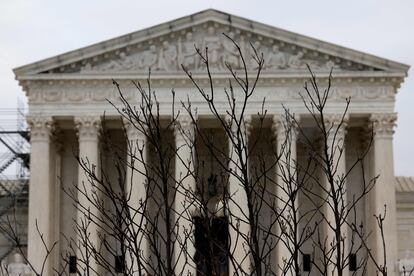Justice Thomas says he didn’t have to disclose luxury trips
ProPublica reported that Thomas has for more than two decades accepted luxury trips from the donor nearly every year without reporting them

Supreme Court Justice Clarence Thomas said Friday he was not required to disclose the many trips he and his wife took that were paid for by Republican megadonor Harlan Crow.
Describing Crow and his wife, Kathy, as “among our dearest friends,” Thomas said in a statement that he was advised by colleagues on the nation’s highest court and others in the federal judiciary that “this sort of personal hospitality from close personal friends, who did not have business before the Court, was not reportable.” Thomas did not name the other justices or those in the judiciary with whom he had consulted.
The nonprofit investigative journalism organization ProPublica reported Thursday that Thomas, who has been a justice for more than 31 years, has for more than two decades accepted luxury trips from Crow nearly every year.
Thomas, 74, and his wife, Virginia, have traveled on Crow’s yacht and private jet as well as stayed at his private resort in New York’s Adirondack Mountains, ProPublica reported. A 2019 trip to Indonesia the story detailed could have cost more than $500,000 had Thomas chartered the plane and yacht himself.
Supreme Court justices, like other federal judges, are required to file an annual financial disclosure report which asks them to list gifts they have received, but provides exemptions for hospitality from friends.
Ethics experts have offered conflicting views about whether Thomas was required to disclose the trips. Last month, the federal judiciary bolstered disclosure requirements for all judges, including the high court justices, although overnight stays at personal vacation homes owned by friends remain exempt from disclosure.
New York University law professor Stephen Gillers, an authority on legal ethics, said Thomas’ statement “is an abdication of his responsibility” under ethics guidelines.
“Thomas is shamelessly seeking to shift the blame for his failure to report Crow’s princely hospitality to advice he allegedly received from other Justices when he joined the court more than 30 years ago. Most of them are now dead and, conveniently, cannot contradict him,” Gillers wrote in an email.
Charles Geyh, a law professor at Indiana University who studies judicial ethics, wrote in an email that he doubts any justice would have advised Thomas against disclosure if he had laid out the details in ProPublica’s report, “hundreds of thousands of dollars in luxurious travel and accommodations at exotic locales spanning decades, from a benefactor who has a deeply rooted partisan and ideological interest in the future of the Court on which the justice sits.”
University of Pittsburgh ethics expert Arthur Hellman said that even if Thomas could reasonably have believed he did not have to report Crow’s gifts, he still should have. “It would have been preferable in the sense of public confidence in the courts if he had disclosed,” Hellman said.
Thomas, the longest-serving member of the court, said he has always tried to comply with disclosure guidelines. Regarding the recent changes, “It is, of course, my intent to follow this guidance in the future,” he said in the statement.
The new reporting requirements appear to cover almost all the travel and lodging Crow provided, Hellman said. The mere need to disclose could make judges more reluctant to accept the gifts in the first place, he said.
“If I had to predict, I’d say Justice Thomas will be seeing less of Harlan Crow’s luxurious properties,” Hellman said.
Democratic lawmakers said the ProPublica story was the latest illustration of why the Supreme Court should adopt an ethics code and further tighten the rules on travel and other gifts.
It is by no means clear that the justices will agree to subject themselves to an ethics code or that Congress will seek to impose one on the court.
Thomas did not refer to any individual trips paid for by Crow. But he said, “As friends do, we have joined them on a number of family trips during the more than quarter century we have known them.”
Last year, questions about Thomas’ ethics arose when it was disclosed that he did not step away from election cases following the 2020 election despite the fact that his wife, a conservative activist, reached out to lawmakers and the Trump White House to urge defiance of the election results.
Sign up for our weekly newsletter to get more English-language news coverage from EL PAÍS USA Edition
Tu suscripción se está usando en otro dispositivo
¿Quieres añadir otro usuario a tu suscripción?
Si continúas leyendo en este dispositivo, no se podrá leer en el otro.
FlechaTu suscripción se está usando en otro dispositivo y solo puedes acceder a EL PAÍS desde un dispositivo a la vez.
Si quieres compartir tu cuenta, cambia tu suscripción a la modalidad Premium, así podrás añadir otro usuario. Cada uno accederá con su propia cuenta de email, lo que os permitirá personalizar vuestra experiencia en EL PAÍS.
¿Tienes una suscripción de empresa? Accede aquí para contratar más cuentas.
En el caso de no saber quién está usando tu cuenta, te recomendamos cambiar tu contraseña aquí.
Si decides continuar compartiendo tu cuenta, este mensaje se mostrará en tu dispositivo y en el de la otra persona que está usando tu cuenta de forma indefinida, afectando a tu experiencia de lectura. Puedes consultar aquí los términos y condiciones de la suscripción digital.








































